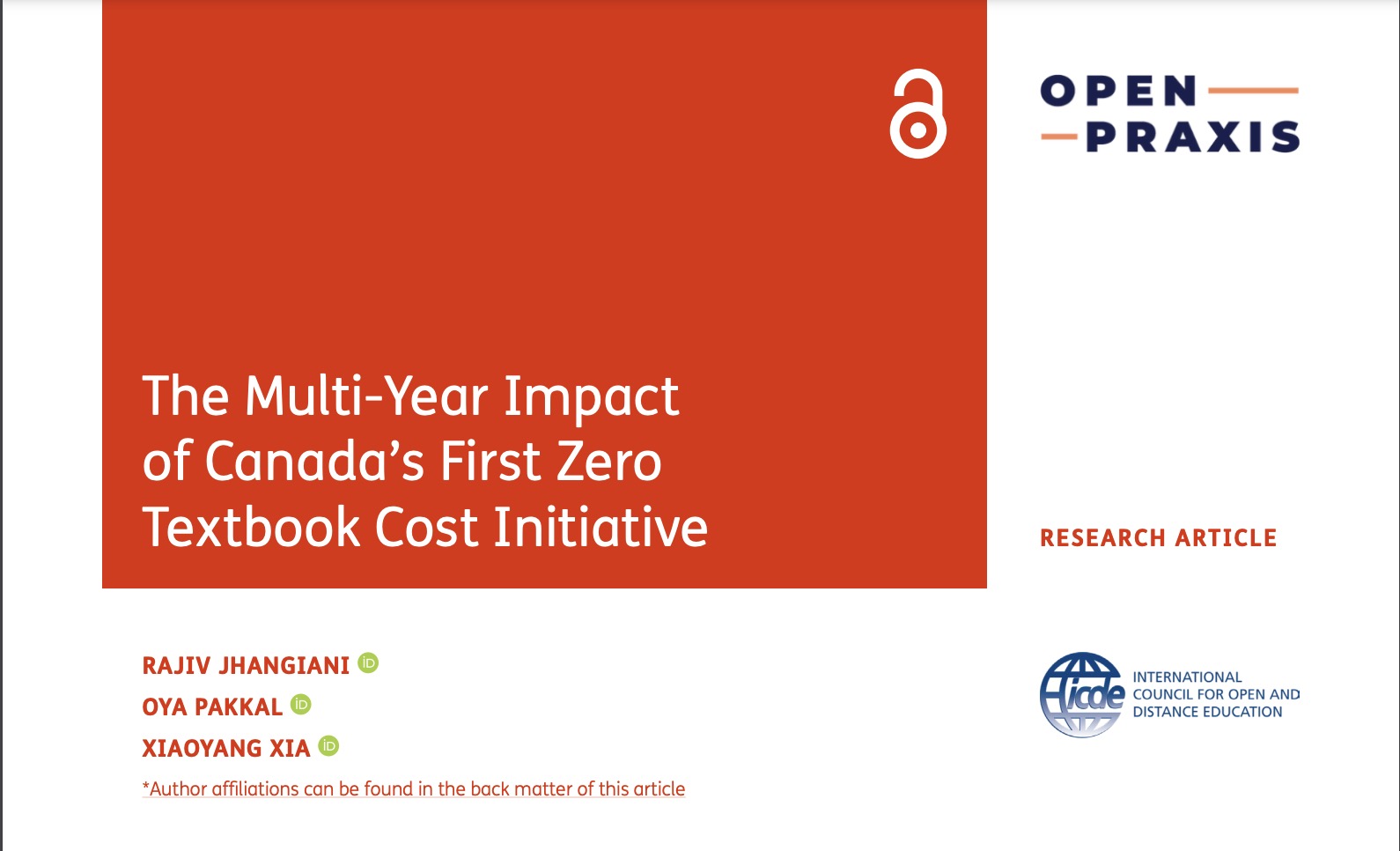Spotted this key and paper worth giving some recognition too as shared by @rjhangiani in social media. Published in the Open Praxis Journal and co-authord by ARejox and Brock University researchers Oya Pakkal and Xiaoyang Xia, The Multi-Year Impact of Canada’s First Zero Textbook Cost Initiative pioneered under Rajiv during his years at Kwantlen Polytechnic University.
Need to make a case for open textbooks and ZTC programs? Arm yourself with this reference. From the abstract:
Kwantlen Polytechnic University (KPU) launched Canada’s first zero textbook cost (ZTC) program in 2018, aiming to alleviate the financial burden of expensive course materials for students. This initiative has since grown to encompass eight credentials and nearly 800 individual courses from which over 24,000 students have benefited from nearly CA$13 million in cost savings. The present study investigated the multi-year impact of KPU’s ZTC initiative on educational outcomes, through an analysis of institutional-level data encompassing 13,605 course sections across the four academic years between September 2018 and August 2022. The study’s pre-registered hypotheses posited that ZTC course sections would exhibit either similar or enhanced levels of student course enrolment, persistence, and performance. Multilevel modelling that controlled for both between-course and within-courses sources of variance showed that ZTC course sections exhibited comparable mean fill and withdrawal rates and slightly higher mean GPAs than non-ZTC course sections. The findings of this study hold significant implications for higher education policy and practice, demonstrating that the substantial student cost savings that result from the programmatic adoption of open educational resources (OER) via institutional ZTC initiatives do not come at the cost of educational outcomes. As post-secondary institutions strive to widen equitable access and better support both pedagogical innovation and student success, the adoption and expansion of ZTC initiatives should be considered as a strategic priority. Limitations, practical recommendations, and directions for future research are discussed.
Learn more about KPU’s ZTC program at https://www.kpu.ca/open/ztc. Just a ferw more word’s from Rajiv’s post:
Leading the development and growth of KPU’s ZTC programs was one of my proudest accomplishments at KPU, as the initiative has grown to encompass eight credentials and nearly 800 individual courses from which over 24,000 students have benefited from nearly CA$13 million in cost savings.
In this study we analyze institutional-level data encompassing 13,605 course sections across the four academic years between September 2018 and August 2022. Multilevel modelling that controlled for both between-course and within-courses sources of variance showed that ZTC course sections exhibited comparable mean fill and withdrawal rates and slightly higher mean GPAs than non-ZTC course sections.
This finding demonstrates that the substantial student cost savings that result from the programmatic adoption of open educational resources (OER) via institutional ZTC initiatives do not come at the cost of educational outcomes.
As post-secondary institutions strive to widen equitable access and better support both pedagogical innovation and student success, the adoption and expansion of ZTC initiatives should be considered a strategic priority.
(emphasis added).
I might have thought that some organization of perhaps PhD researcher had compiled a list of all institutions with ZTC programs. My web search mostly returns institutions with their own programs (140k results for “Zero Textbook Cost”)
And to show the weakness of summaries from a Google search for “directory of ztc programs” returns a statement about if such a directory existed what it might contain. What use is that?
I am going to count on some community wisdom here!
And beyond this rant, please let us and Rajiv know what you think of this new research paper.
`
